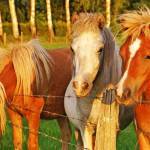How to Feed a Mini Horse
Keeping Miniature Horses Healthy by Managing Diet

They're tiny, cute, and appealing, and just looking at a Miniature Horse makes the average person want to cuddle it and feed it a treat. With obesity being one of the most common problems among Miniature Horses, this very natural response can lead to health challenges in a breed of extremely easy keepers.
Two conditions work together to undermine moderate body condition among Miniature Horses. First, most Miniature Horses do very little if any work, so they burn few calories beyond what is needed for maintenance. Second, as with many small breeds, a Miniature Horse's metabolism is quite efficient at making the best use of everything it eats. Energy needs are lower than for some other breeds, and any calories that are not immediately needed are stored as fat.
Miniature Horse owners who have owned full-sized horses may be tempted to use similar principles in deciding how much to feed their pint-sized equines. They may get into additional trouble by overestimating the body weight of their charges and figuring feed amounts as a percentage of this figure. Actually, most Miniature Horses weigh no more than 200 to 250 pounds, with some weighing considerably less. Regularly weighing the Miniature Horse on a scale gives the most accurate information on weight loss and gain. Weight tapes are designed for larger animals and are not generally accurate when used on Miniature Horses. One formula for calculating a Miniature's approximate weight in pounds is (9.36 x girth measurement in inches) + (5 x body length in inches) – 348.5. A seamstress tape is sufficient for taking these measurements.
Unless they are in moderate to heavy work, Miniature Horses don't need to eat a lot of grain. If a horse is too heavy or is gaining weight, owners have the option of cutting out all grain and feeding a balancer pellet to supply vitamins and mineral without loading up on starch-rich feeds. Even without grain in the diet, full pasture turnout can be problematic for some Miniature Horses, especially if the forage is of very good quality. Muzzling or drylotting can allow them to get exercise and mingle with the herd while avoiding too much grass. Alfalfa hay is too energy-dense for most Miniature Horses; grass hay is a better choice, fed at the rate of about 1.5% of their body weight in hay daily.
Some Miniature Horses are used for driving, breeding, or showing in hand, and these animals may have higher caloric demands than their idle cousins. These horses should be given more hay as a first step. If they are unable to maintain body condition, owners might add a small amount of grain or a little alfalfa (lucerne) mixed into the regular hay ration.
Is extra body fat just unsightly, or does it actually threaten the health of Miniature Horses? Unfortunately, Miniature Horses are much more likely than full-sized horses to develop hyperlipemia, a serious problem related to fat mobilization and metabolism. In Miniature Horses and some pony breeds, stressful situations such as pregnancy, illness, lactation, or feed deprivation can be triggers for the release of stored fat and its conversion to glucose. The process can easily overwhelm the liver's ability to function, and liver failure or rupture may occur. Obesity adds to the likelihood of this reaction, so preventing excessive weight gain is more than just a cosmetic issue. One of the first signs of hyperlipemia is a decline in appetite. This may be followed by colic signs, weakness, muscle tremors, lethargy, diarrhea, or seizures. Early and aggressive veterinary treatment is necessary to save affected horses, and up to 70% of Miniature Horses with hyperlipemia die if the liver has been damaged.
To minimize the chance of a Miniature Horse developing hyperlipemia, obesity should be avoided by careful dietary management. Care should be taken not to expose Miniature Horses to extreme physical stress. A veterinarian should be consulted if a horse shows illness or loss of appetite, as treatment is much more effective if it is begun as soon as the condition is noticed.
Source: https://ker.com/equinews/keeping-miniature-horses-healthy-managing-diet/
0 Response to "How to Feed a Mini Horse"
Post a Comment